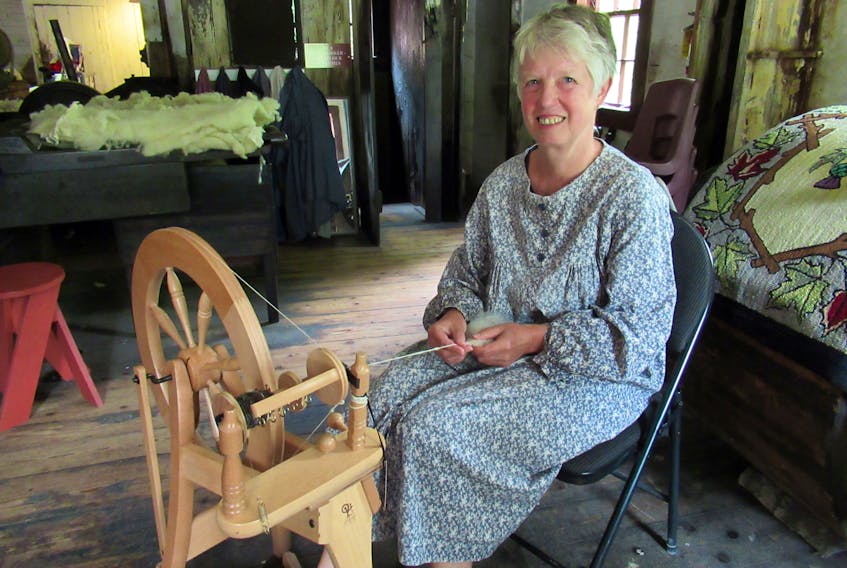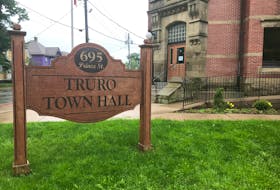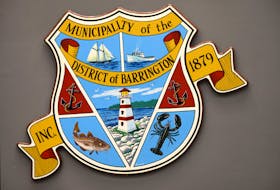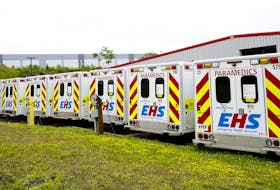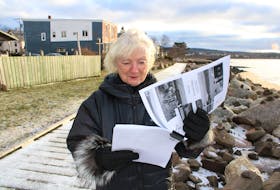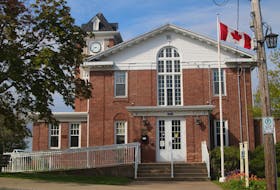If you’re thinking about enrolling in a spin class, but don’t relish the thought of sweaty calorie burns and unflattering spandex shorts, consider the spin classes offered at the Wile Carding Mill Museum.
However, the museum’s version of spin classes harkens back to the day when farmers took their freshly shorn sheep’s wool fleece to carding mills for cleaning, carding and spinning into wool yarn.
Carding refers to the process of disentangling or combing the wool fibres, while spinning is the act of using a spinning wheel to twist the wool fibres into yarn, which is collected on wooden bobbins.
Museum interpreter Karen Robar said Wile Carding Mill is the last of many small businesses that were situated in Bridgewater’s 19th century water-powered industrial park known as Sebastopol.
In addition to carding mills, the Sebastopol area was home to grist mills, a saw mill, foundry, tannery, and a wheel and carriage factory.
Sources of water to power the businesses included Wile Lake, Sandy Brook and Whitman Pond.
Robar said constant bickering over water rights among business owners became downright vicious.
“There were many lawsuits over who had water rights and who was taking unfair advantage. That’s why the area was called Sebastopol (also spelled Sevastopol), after the site of a bloody battle in the Crimean War, which would have been fresh in everyone’s minds during that period,” she said.
When visitors enter the museum today, Robar or other interpreters take them on a 40-minute tour.
“We guide them on the path the wool took through the mill, and speak about each station where the girls would work at processing the wool, what the finished product would look like, and how much it would cost. The big finale is a look at the water wheel that powered all the machinery,” said Robar.
“Over time, the sheep population and mill revenue declined. It became more of a cash economy, and people became less reliant on themselves, and didn’t have to process their own wool,” she said.
Robar said the equipment used at the circa 1860 carding mill is intact, but the machinery doesn’t run.
Petra Fischer-Brunke, a senior from Hanover, Germany, and a seasonal Blockhouse resident for the past 19 years, started spinning in her mid-20s. Responsibilities as a Lutheran church deacon and manager of 100 employees at a large seniors care facility caused her to mothball her spinning wheel.
Three years ago, Fischer-Brunke asked a Blockhouse neighbour for some of her sheep’s wool, then sat down at her spinning wheel for the first time in decades. “I thought I had forgotten to spin, but it is like riding a bicycle, and it’s just as much fun,” she said.
“Then one day I visited the Wile Carding Mill Museum and learned it offered spinning demonstrations every Thursday. I was invited to bring my spinning wheel. I have been demonstrating there ever since, talking to people and introducing them to spinning,” Fischer-Brunke added.
After a demanding and stressful work life, Fischer-Brunke finds spinning therapeutic in retirement.
“It is so relaxing and calming. I recommend it to anyone dealing with stress and anxiety. Spinning will take it all away. The mill is a peaceful place, a little jewel in the middle of town,” she said.
Lynette De Montreuil, site supervisor at the Wile Carding Mill Museum, said the museum recently received a generous grant which enables it to remain open longer than usual this year.
Provided by the Tourism Industry Association of Nova Scotia and the Nova Scotia Tourism Human Resource Council, the grant program is an initiative to support seasonal workers throughout the province, and allows tourism employers to extend their operating seasons beyond traditional dates.
“For the Wile Carding Mill Museum, it means we can extend our season by two weeks, until Sept. 28, allowing us to continue to offer tours to the general public, and bring in community groups such as Girl Guides and Brownies, as well as school groups,” said De Montreuil.
“The extension allows us to determine if more people are accessing our services in late September, as many people continue to visit our region in the fall. And from an educational perspective, it’s great to be able to support teachers in our community and other organized groups,” she added.
The carding mill will host its first-ever twilight event on Thursday, Sept. 12. Author, storyteller and South Shore Breaker columnist Vernon Oickle will share tales of Nova Scotia folklore, superstitions and ghosts. Seating is limited. Call 902-543-8233 to reserve tickets, priced at $10 per person.
Located at 242 Victoria Rd., the carding mill is open Tuesday through Saturday, from 9:30 a.m. to 5:30 p.m. until Sept. 28. For admission prices visit [email protected] or call 902-543-8233.

